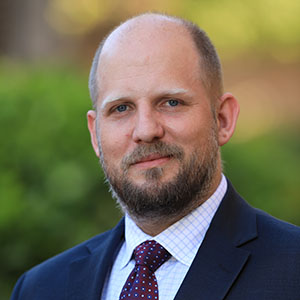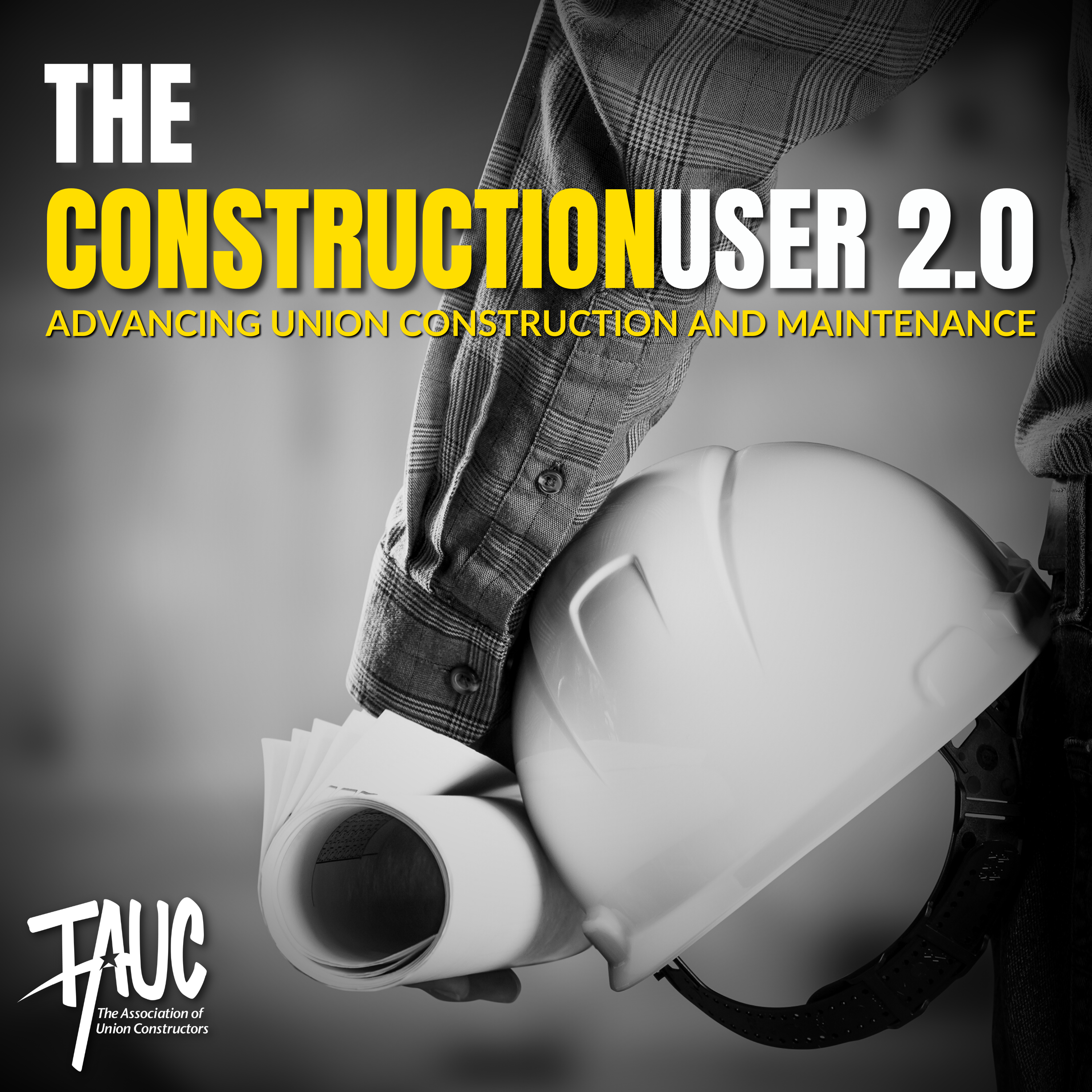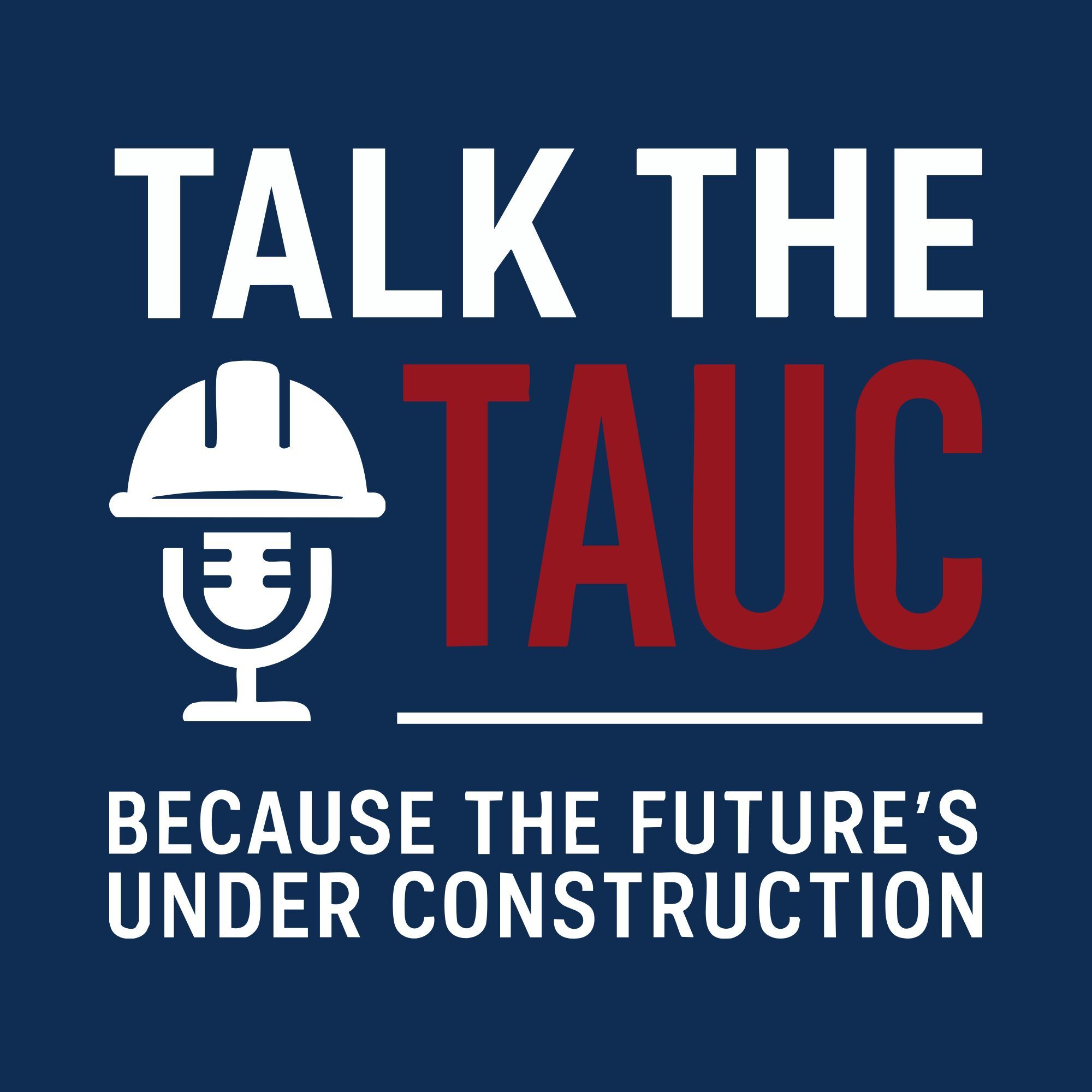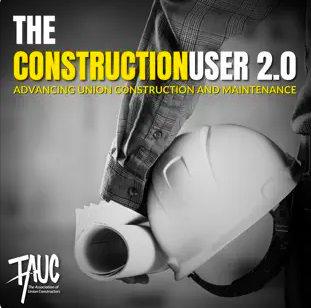Episode Transcript
Kirk: Hello. Welcome everyone to the very first episode of The Construction User 2.0. Today, we're going to have a special guest, Mr. Todd Mustard. He's one of the vice presidents here at The Association of Union Constructors. I wanted him to come on today because he was here when The Construction User all began. How are you doing today, Todd?
Todd: Kirk, I'm doing great. Thanks for having me on. I appreciate it.
Kirk: Of course. First off, just to get it off with the really important stuff out of the way, if you were stuck on a desert island forever and could only bring one thing, what is the one thing that you cannot live without?
Todd: Oh, my goodness. What can I not live without? You put me on the spot here. I couldn't live without basically everything. Sustenance is obviously necessary. Probably, if I'm on a desert island, a Swiss Army knife would probably be cool.
Kirk: Swiss Army knife? That's a solid option. Tell me about TAUC and 15 years ago when The Construction User was first kicking off. Where did it all come from?
Todd: When I first started with the association, I came on board as the manager of communications. At the time, we were doing a quarterly newsletter with no advertising. It was four, maybe six pages in length. It wasn't anything too substantial. My predecessor, a woman named Jennifer Perez had taken that on.
Shortly after, we had to transition leadership. A gentleman by the name of Jerry Schreiber became the new—it was NEA-The Association of Union Constructors at the time—president of the association. He believed that we needed a magazine, a full color, high quality thing to basically send out to the entire membership to get them comfortable with what we're doing as an organization, let them know what's happening in the world of construction and maintenance, let them know what was going on under the National Maintenance Agreements. In 2004, we created The Construction User magazine. The first issue came out that fall.
Kirk: 2004 to 2020, so we're 19 years.
Todd: Yeah, 18½.
Kirk: Eighteen and a half years? Math is not my strong skill. Throw that out there.
Todd: I will say, Kirk, the first couple of years were definitely a learning experience. The quality in terms of the design of the covers and interior was definitely a little spotty, but we slowly caught on. We got our feet underneath us.
In 2007, when we changed the name of the organization from NEA-The Association of Union Constructors to just The Association of Union Constructors/TAUC, that is when we did a full blown revamp of the design of the magazine. It has remained the same since 2007 in terms of masthead and all this other stuff.
Kirk: That's right. That's where I'm getting the 15 because it was a few years later. It's been The Construction User from the very beginning, correct?
Todd: It has. That's correct.
Kirk: That's awesome. Obviously, we talked about Jerry Schreiber and why it all started. Did it go the way you guys thought? It became quite the thing. It has evolved a lot. Is it where you thought it was going to always be? How did that go?
Todd: It has definitely evolved over time. A big part of that is we started hiring people who had expertise in magazine content and creation, whereas I have little to no experience as related to this. The people that followed me were far more capable.
[00:04:40] was the first gentleman in 2006 who helped with the transition in terms of design. He was shortly followed by Lisa Tengger who was with us from 2008–2010. Then David Acord, for that last 2010–2021ish, really took it to a next level, if you will.
Kirk: Now we're here on The Construction User 2.0. It entered its first, big huge change in at least format. Now, here we are on this podcast. What would you say is the difference in its purpose? Is it the same thing? What information are we trying to get out there? What's the goal?
Todd: The magazine was a great vehicle for us to get our message out and brand out to a broad audience of people. We had a subscription base of roughly 9000 people. I think with this evolution, the idea is to get more timely information that's pertinent to people's lives and businesses out to them on a much more frequent basis.
Instead of waiting every quarter or reading something that was written 6–8 weeks ago, you're now getting an almost live perspective from people that you care about and want to know about. Topics that will still remain a component of this moving forward will still be our environmental health and safety perspective, things that are going on as relates to industrial relations, or labor relations, hot topics as relates to innovation in technology in the construction industry, and of course, government affairs, legislative affairs, regulatory affairs, things that impacts our contractor members, but are also our partners in the trades and the owner and clients that they work for.
Kirk: Obviously, we're The Association of Union Constructions and management professionals, 14 unions. Just like you were there 19 years ago when The Construction User started, and now we're here, we're starting again. In 5 years, 10 years, 19 more years, what is the content that we want here? What are those conversations? Who are the people that we want to be talking to? Like you said, those timely current conversations, what does success look like? Who are the gets? Who are the people we want to be talking to and hearing from?
Todd: I think it's anyone who is passionate about the construction industry and potentially has influence or subject matter expertise that our audience would really care about. In our audience, TAUC has always prided ourselves on being tripartite in nature, which to us means we represent contractors, but we also have partners within the 14 building trades unions, and then we also want to engage the owner client community in a way where we're establishing relationships that will hopefully be long and fulfilling.
I think there's a way to create content that will appeal to all three of those audiences in something worth exchanging perspectives and ideas from diverse backgrounds.
Kirk: I'm excited about it personally, just because I think that it's one thing to sit down and read a polished presentation of, oh, this is what this person thinks about this thing. I think it's going to be a really interesting journey to be having an ongoing weekly conversation, where it can be a little bit more on the spot. You don't know what you want to bring on a desert island, but sometimes you don't know what to think about until someone puts the questions in front of you. What are those conversations going to be? It's great to talk generally, but what are those conversations going to be?
Todd: One thing I was thinking about as I was preparing to come on the podcast was how the magazine itself evolved over those 19 years. I was going back because we've got a spreadsheet where you got all the covers from every issue we've ever done. I'm looking at the spring issue of 2009, where the cover story was literally the automotive collapse.
Going back to 2009, you have to remember, that is when recession hit the United States. GM and Chrysler at the time—now Stellantis—were hit very hard times. Ford was on the verge of also not bankruptcy, but they were the lone US automotive manufacturer that didn't require a pretty significant influx of cash from the federal government, which the Obama administration assisted with. That's 2009.
Fast forward to 2023, the automotive industry is one of the biggest owner, clients, that's providing billions and billions and billions of dollars worth of work as we transition to an electric vehicle form of transportation with these battery manufacturing facilities, all of which is being done under the NMA. It's just amazing how 14 years later, we can go from collapse to just thriving. That was one thing that I just thought was really interesting to see and to think about.
One of the things we did for a while was this photo contest of the year, where each year we would survey our members, ask them to submit different photos. We ran that for a good five years, six years, seven years, putting those photos on the cover of the magazine and highlighting those projects. That transitioned now to where we're doing this Project of the Year award, the Joseph La Rocca Award, which is also very cool. It's interesting to see how these different things just transition and evolve over time.
Another thing that we started doing in roughly 2015–2016 was we knew we were holding or have access to a variety of different data that we as staff or our team can see, but we rarely put that into a consumable piece of material that our members can also check out.
In 2016, we started doing the, we call it the big data issue. We literally had, okay, here are the number of work hours being submitted by our contractors for work under the National Maintenance Agreements, here are the industries that work's being done in, here are the crafts, by work hour in terms of who's utilizing the NMA.
Shortly thereafter, in 2016, we started doing the top 50 NMA contractors. I think some of those things that we did with the magazine, you're probably still going to see in this podcast or a variation of which because some of those things were very successful. We don't want them to go away by any means. We know the power of the infographic, for example, and being able to utilize and repurpose some of that data in a way that's both interesting but also insightful.
Kirk: To that exact end, the number of times I have looked at a block of data like, oh, you'll find this really interesting, and someone hands me a big block of data and I'm like, I'm sure I find it interesting. What did you find the most interesting? I'll see if I agree with you. It's one of the other things that the magazine is great for getting the data out there, but now we have an opportunity to explain why it matters and have a conversation about why it matters.
Forget why it matters, just what it all means. What the implications of some of this big data are because I don't know that there's a universal even within the industry, an industry-wide understanding of what some of this data and information coming out means.
Todd: I think what we're doing with labor supply survey, for example, and highlighting different areas, where XYZ craft might be in high demand, I think all that stuff can be repurposed to showcase not only how desirable these careers are, but also hopefully provide our listeners with a better understanding as to why they should consider construction as a career opportunity.
One of the biggest things our industry is facing right now is labor supply, availability, and shortages. One of the biggest things we have to do over the next decade or two decades is better educate the general public on why construction is a fantastic industry, which those of us who work in it know. For many people, there's a cloud around it of misperceptions that just needs to be cleared.
I think a big part of this is really demystifying, things that we understand but a lot of people outside our industry may not, not because they're dumb by any means, but just because they literally haven't been connected to it or been explained how a project labor agreement works, for example,
Kirk: Whereas not directly in construction, I've been working with and around unions in various capacities for a very long time. Even though I was remarkably aware of how union contracts work and had worked under multiple union contracts, it wasn't until working here for the last year-and-a-half that I've seen where the rubber meets the road, and understand a lot more of just how important, intricate, and nuanced it is even of those that use them. There's so much more to it and goes into it that we just don't know about.
Todd: It's very true. There are many, many layers of the onion. Typically, the outside layer is depicted in not the most glowing terms in either film, books, or whatever, the news, et cetera. Construction is just such a vibrant industry. It's just so the spectrum to which it impacts all of our lives from the roads and highways we drive on, to the buildings we work in, to the theaters we go see, music, plays, or movies in.
Construction is the invertebrate or the backbone of society for many of us. It's exciting too because right now, there's just going to be this massive investment in ensuring that the United States remains the superpower that we are. A lot of it has not been updated in a way that it could or should be. There are so many people that will benefit from the construction maintenance activities that are going to take place in the next 5, 10, 15, 20 years, forever, to be honest.
Kirk: Going off of that, I have an interesting follow up. Within and outside of the construction industry, we're hearing a lot about unions right now. Various industries are unionizing, organizing, or trying to, and we have almost like a repeat of 100 years ago. We have union busters popping up and trying different tactics to keep things free. Here's my question. Why union construction? Why is that such a vital piece of the pie?
Todd: Union construction is such a vital piece of the pie because we're setting the bar in terms of what the livable wage is. People want to do things that are meaningful. Construction is one of those things where you go out, you do it, you can point to something and say, wow, I helped build that.
I think union construction specifically is incredibly important because the workers themselves have a voice in the process. What has been collectively bargained at the local level is the benchmark in terms of what both the employer and the employee believes is an adequate wage and fringe, et cetera.
I think, ultimately, it's the bar. Currently, we set the bar in all these different locations in terms of where others should meet. Obviously, there's an ongoing debate on whether you want to buy, use taxpayer money, or any private employer's money to purchase "construction and maintenance activities." You want the best price or the best value.
I think what this conversation really is about is that we believe union construction is the best value. It's where you go to get the highest trained, best trained people, the people who are working the safest. If that's a priority to you and your business, if you care about the people that not only work for your company but are working to make your company better, i.e., building the buildings or manufacturing facilities that they're going to be working in, then ultimately, do we care about the people of this country? And do we believe they deserve a living wage?
Do we believe that this is a hard job and can be a dangerous industry? Those people should be incredibly well-trained, provided the best personal protective equipment, for example. If that's what we believe, then union construction is the bar in which that metric is, that box is checked, if that makes sense.
Kirk: It absolutely does. I really appreciate that answer. It's always fascinating to me, how high up a person can get or how intelligent a person can get. The difference between price and value is not always readily apparent. People conflate those two terms.
They're almost opposites. Union construction is the highest value. It might not be the lowest price, but what does that mean? Where is that savings coming from? Is it going to be in higher quality work? Is it going to be in a safer worksite with less injuries? What does that cost? It's a more assured workplace.
The quickest way to do something wrong is to go with the lowest bidder. The quickest way to mess up a project is to raise prices down. It's fascinating to me that the number of intelligent, incredible, capitalistic, wonderfully brilliant people that think going with the lowest bidder is the best idea rather than the safest worksite, the most trained worksite, the best valued rather than just the lowest price.
Todd: Absolutely. I think if you're given the choice over your lifetime, would you rather buy one thing that's going to last you the majority of your life, or do you want to buy 20 of those things because they're going to break every two years? That's where I believe it's worth it to pay more for value than it is to go cheap and unfortunately, not have that. It's almost less responsible too from not only a consumer standpoint, but environmental, et cetera. There's a ton of efficiency gains from choosing value over price.
Kirk: I completely agree. Thank you, Todd. We're wrapping up here. This is, like I said, the very first episode. As we transition this thing that you helped start and we're bringing you to the next generation, any parting thoughts to the listeners on this stage of the journey?
Todd: I think with anything we do, we don't want this to be a one way street. We would love feedback from anyone who's listening to this to say, what did we do right? What did we do wrong? Who would they like to see included and incorporated?
Obviously, we have our own ideas, but I think anything like this can only benefit from having a vibrant community that surrounds it, which is what TAUC has tried to do with its membership over the course of the last 50-something years. Your feedback is incredibly valuable to us. If there's somebody you think we should be interviewing, seeking out, or a subject matter you'd love us to touch on, please reach out.
Kirk: Thank you so much. We hope to hear from all of you moving forward and thank you.
Todd: Thank you, Kirk.



